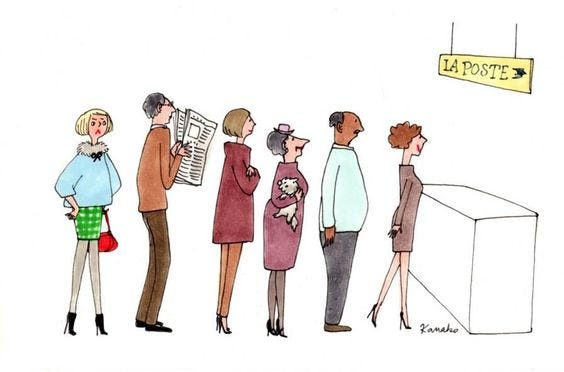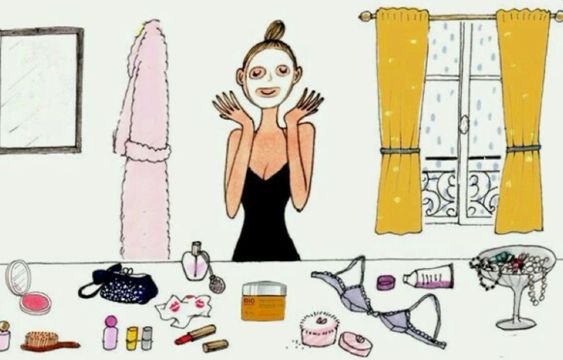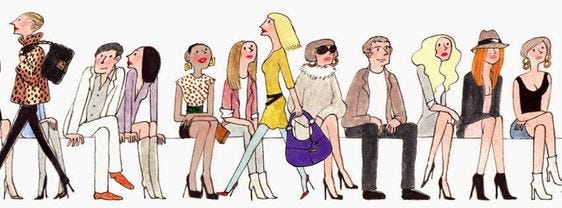manners-maxxing and the personal style crisis
demurity as satire, etiquette as aesthetic, and why politeness alone won't save society
Today we are talking about…manners.
This essay will delve into:
the rise in etiquette content and its history within women’s lifestyle magazines
why manners-maxxing is a response to the personal style crisis
the limits of politeness as an indicator of social utopia, using the west’s perception of japanese societal norms as a case study (featuring an interview with my friend kana!)
manners are having a moment
the internet fixation on manners started gaining momentum in june when the nyt published a “guide to partying” article focused on “etiquette takes” from 43 people, including heiresses, celebrities, and well…people who have the resources to be preoccupied with how to act at parties! a certain miss rebecca gardner got roasted for saying it’s rude to ask guests to remove their shoes (clearly she doesn’t have asian friends lol) but tbh, that quote was probably thrown in there for rage bait.
fast forward to august and demure is the vocab word of the month. this term has been previously used by several trans people of color on tiktok, and was catapulted into virality due to creator jools lebron’s videos where she discusses how to behave in a “demure, considerate, and mindful” way in various situations. their usage of “demurity” is meant to be satirical and tongue-in-cheek, because the trend stems from trans women of color whose femininity and presentability is always under scrutiny within a white hetero-patriarchy. however, as more creators (and of course, brands) jumped in on the trend, the term has lost its original tone of satire.
so now you have a lot of people are talking about manners—what’s rude, what’s considerate, what’s demure, but they’re approaching it from fundamentally different perspectives and intentions.
the nyt party hosting article essentially tackles an age-old question crammed down the throats of the american middle class: how can i maintain and improve my position in polite society, to obtain social approval from the group i wish to be a part of? however, the demure trend (in its original inception) approaches it from a different angle: how can i use internet satire to critique the oppressive standards of polite society, which is essentially a euphemism for the white upper class?
amongst this backdrop, i also noticed an increase in etiquette-themed newsletter posts within the substack verticals i am most familiar with: fashion & beauty (largely a female demographic), and culture.
to describe this phenomenon, i landed on the term manners-maxxing—because i think we are witnessing a new iteration of a lengthier obsession over how to maximize certain desired traits. the suffix has gotten tacked onto everything! a brief history of how the “maxxing” concept came to dominate these self-improvement agendas in the past year:
looksmaxxing originated from an incel subculture aimed at teaching young men that “maximizing” their appearance and desirability will lead to social acceptance.
auramaxxing started gaining steam this summer, and it’s oriented towards the intangible aspects of individuality, rather than appearance. as laura pitcher writes for the cut, “aura math is online is inconsistent and subjective […] the general rule is you gain hundreds or thousands of points by doing something impressive, intriguing, charismatic, or authentic.”
young men make up most of the audience for both these online subcultures. it’s a practice of men surveilling men over performances of masculinity. pitcher interviews an auramaxxing tiktok creator, frankie meki, who explains that “the standards for us on social media are insane, and I feel like a lot of average guys today just want to be seen and upgrade their social lives.” the article emphasizes that while women also partake in auramaxxing conversations, they tend to do so by opening up about vulnerable experiences and emotions.
however, with manners-maxxing, the conversations are distinctly centered in women’s online spaces (whether they are meant to be satirical or serious). i see auramaxxing and manners-maxxing as two gendered sides of the same coin. this begs the question: why are behaviors, rather than aesthetic appearances, suddenly under such intense focus? even up until last year, the pursuit of individuality identity revolved around an exhausting carousel of aesthetic after aesthetic, -core after -core.
now, it appears the assessment of personality and personhood has shifted to how you act—rather than things like how you dress or do your makeup.
the rise in substack etiquette content
against the backdrop of demurity and auramaxxing, there’s been a rise in etiquette-themed writing on substack. here are two examples that resonated highly with their audiences.
a modern day etiquette guide by angelina and emily
we’re trying to have a society here by habitually chic
these posts offer modernized visions of what good manners should mean in present day. i nodded along vigorously to “pour water for others before yourself” and “get to know your neighborhood.”
a common theme in these posts is the emphasis on concepts like “kindness,” “the golden rule,” and “consideration of others,” rather than a literal resurgence of traditionally WASP-y etiquette rules.
those types of rules were instruments of violence and now understood as tools of misogyny and racism. after all, the mother of etiquette books, emily post, came from a gilded age high society family who had a crew of servants in their employ. and jim crow laws were seen as a legitimate form of racial etiquette. while we may use the word etiquette these days to refer to pro-social behavior, it’s always been influenced by social norms that reinforce asymmetric power dynamics.
the etiquette industry (books, magazines, classes, finishing schools) arose out a need to control the behavior of women in places they are told they do not belong, such as in the office or in athletics.
how the etiquette industry came to be
a vox article from 2017 explains the historical context in which etiquette columns were developed:
“The early-20th-century spike in literacy and the growing middle class created an opportunity for a wider print audience, but in order to be tapped, its tastes had to be cultivated. In other words, if editors and publishers wanted to maximize the potential of the growing market, they needed to train their new consumers to want what they were selling.”
this is an illuminating analysis. when a large chunk of the middle class can suddenly read, media stands to make a lot of money if they can (1) convince the middle class to want to pass as upper class; (2) ply them with “education” on how to do so.
the allure of upward mobility is the very bedrock of etiquette content in women’s media. it baked into the business model of fashion magazines: if you can train your reader to desire the rewards of high social status/approval, AND you convincingly equate clothes from brands like khaite and celine with high social status, you can make a lot of money.
in a 2005 guardian article titled “nice girls don’t eat cheese at dinner parties,” hannah booth examines why retro etiquette books suddenly surged in popularity. this is from about 20 years ago, but i believe the writer’s insights relate to the current manners-maxxing phenomenon.
she interviews publishers about the rise in reprints of classic etiquette books, such as the perfect hostess by rose heaton from the 1930s. the publishers believe the market for retro etiquette books was driven by a collective private desire among women to feel greater social confidence. on the surface, titles like the perfect hostess seem so campy and absurd enough that they pass as humorous, but publishers believed that in private, women were riveted by old-fashioned guidance that promised a sense of social security.
booth also interviews two women who founded a modern-day finishing academy in cheshire, which promises to teach students “deportment, table manners, bridge and flower-arranging.” one founder attributes the overwhelming interest among women to an underlying desire for confidence:
"They have a genuine interest in etiquette because it gives them confidence. We teach them how to greet people, how to stand properly and how to dress. If you know how to do these things, you'll feel better about yourself."
the part no one is saying out loud is that these women probably lack confidence due to years of internalizing manufactured insecurity under patriarchal capitalism. going to a finishing academy may assuage the feelings of anxiety and insecurity prompted by class hierarchy.
aesthetic burnout and the personal style crisis
i think we’re all on the same page that aesthetic trends don’t seem to mean anything anymore. i am already dreading [fill in the blank] girl autumn. there’s been too many, at impossibly high speeds and higher turnovers that feel nauseatingly shallow. and i really believe people are automatically skeptical and distrustful of new aesthetic trends these days.
this aesthetic burnout is linked to the personal style crisis, where people express frustration over a lack of style “identity.” it’s a highly relatable experience, which explains why personal style writing, coaching, and internet stylists have grown in popularity—especially after the peak of the pandemic.
we have realized a person can dress in whatever aesthetic they want, but it does not say anything real about them. maybe there was a time years ago when you could run into a girl at a coffee shop wearing a paloma wool spiral sweater and imagine that it said something about her interests or personality? but fashion trends have accelerated so quickly that aesthetic discourse collapsed into itself. AND, consumer spending is down because of a cost-of-living crisis. on substack, i’m hearing many readers express interest in fashion newsletters that do not solely focus on shopping.
with less disposable income and less interest in style aesthetics as a means to expressing individual identity, i believe we are at the cusp of behaviors-as-identity. “tomato girl” falls flat and empty…elicits an eye roll. but “drops-a-tomato-tart-off-for-her-neighbors-girl” is admirable, pure hearted, and thoroughly high aura.
it’s sort of like a repackaged version of “money can’t buy taste.” wearing xyz designer bag doesn’t automatically mean you are seen as classy, but doing good deeds might. but because our behaviors are shared and surveilled through social media, i do worry that the idea of having good manners will become yet another performative aspirational thing. like that episode of black mirror, “nosedive,” where you can rate people based on your interactions with them. we see how terrifyingly dystopian “aura points” or any quantification of human behavior can become.
limits of politeness as an indicator of social utopia
so i was reflecting on the *broken society vibes* that reverberate through today’s etiquette discourse. it seems like everyone has some visceral memory about encountering rude behavior, some airport or grocery store horror story. it made me wonder if there really is more rudeness, or if we just have more social outlets to vent about it now. it’s possible that karens and kens have always existed in the same magnitude in society, we just didn’t have the technology to film their meltdowns and post them on the internet for everyone to see. alternatively, the idea that society’s manners have gone down the drain could be attributed to increased demographic friction. groups with differing sociocultural norms are interacting more than ever before—so there is no prevailing single standard of politeness any longer.
when i spoke to friends and family about this essay i was writing, everyone expressed some desire for more politeness, honesty and good character in the world. i want that too. it sounds nice.
but it’s also worthwhile to investigate where politeness gets you as a society, what it can and cannot achieve. i thought immediately of japanese society and its perception as a futuristic utopia, especially among westerners who are infatuated with its high standard of politeness, cleanliness and overall orderliness.
my friend kana generously shared her musings and personal opinions on the topic as a second-generation japanese-american. i synthesized her thoughts below.
“japanese society is structured around politeness, and it is a guiding principle for how people interact with others and how they operate in society,” she explains. politeness is seen as the bare minimum, and while japanese people hold pride in the standards of politeness, it can also feel suffocating. if a person deviates from the expected norms of social behavior, they are “seen and treated as lesser than, and not deserving of respect.”
kana emphasized that the rigidity of this social framework can be very problematic, because japan has a diverse population with varied cultures, despite the government not wanting to admit it. when asked about the consequences of non-conformity, she said, “i think you’d really suffer.” there’s a lot of stigma surrounding mental health struggles, so it’s seen as impolite to talk about.
finally, she feels that any discourse “praising japan as this so-called heaven is incredibly harmful to the millions of people and their descendants that were targeted in Japan's violent history (such as WWII atrocities) and current day practices (read: racism in Japan from April 2024; lawsuit for racial profiling from January 2024).”
what i gleaned from kana’s insights is that politeness should not be the end-all-be-all for any society. manners are not a replacement for the things that a truly good society should provide for its people, like equitable access to clean water and mental health support.
tonight i had dinner with my gen z sister (i’m technically a milennial in case you didn’t know lol) and had her read a draft of this piece. i will leave you with some of her takes on this, because i think it pulls another generational perspective into the conversation.
she did not know who emily post was.
she is sick of aesthetic -core after -core.
she believes that good manners boil down to being self-aware and informed about the world—thinking about things bigger than yourself.
she feels that gen z gets an unfair reputation for having bad manners, and it comes from the idea that they are spoiled and selfish because they never struggled for what they have.
she describes her generation as politically aware and brave. i thought “brave” was such a specific word to use and asked her to elaborate.
she says gen z is not afraid to challenge authority because their eyes are open to unfair power dynamics. “being annoying isn’t illegal.” they do care about direct peer approval, but not broad social approval. they reject respectability politics, and embrace being “weird” and “off-putting.” i press further, asking what she means by off-putting.
she shrugs—“idk. it’s just like, fuck the system vibes.”
thank you for reading! comments are open for discussion and reflections.
i’d love to know what you think about the recent conversation surrounding all things MANNERS.
xoxo viv







omg love all your writing and this one so much! soooo fun to read and i think deeply fascinating how quickly the demure has become immediately detached from the queer trans ironic origins and straight into a reification of normative feminitity, its so hard to watch and I think extremely apt for this political moment in which historical genealogy is so neglected (liberal individualistic coconut pilled vs historical materialist internationalist coconut tree), which is why I so appreciate your research work and think it is deeply important. Mannersmaxxing is sooooooooo good, reminded me of two things, both the need for the expansion of "the trend", and thus corporate power into more and more minute fractions of our lives in order to continue the rate of accumulation, and an acknowledgement of the surveillance culture we live in where policing one's body becomes an internal behavior. I'm so curious also what the intensification of class aspiration through mannersmaxxing means for the economy. Feeling like Jaden Smith political and economic state of the world rn!! That being said, I would love to learn how to play bridge and arrange flowers.
Also when I grow up i want to be as brave as your sister <3
WHEW! this is everything I wanted to read & more. so glad you name that the “golden rule” & similar rules “were instruments of violence” & “tools of misogyny and racism.” A lot of the etiquette pieces here & elsewhere fail to recognize that (unsurprisingly)
I forget who told me this, but it was in the context of mental health support: treat people how THEY want to be treated. A much better maxim to live by, imo
Such an excellent read (also loved your sister’s insights at the end!!)